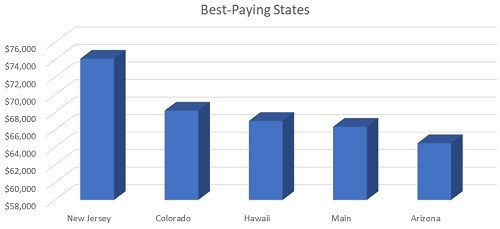Marriage, couple and family therapist is a rewarding career in many ways – but is salary potential one of the advantages? It depends in large part on your industry of employment. The United States Bureau of Labor Statistics (BLS) reports that marriage and family therapists earn a median wage above the median for all occupations, but how much above varies by industry. Other factors that affect earning potential as a marriage and family therapist include geographic region and highest level of education.
IMAGE SOURCE: Pixabay, public domain
The Highest-Paying Industries for Marriage and Family Therapists
Marriage and family therapists, also called MFTs, are mental health professionals who provide cognitive-behavioral therapy, psychotherapy and other therapies to families, couples and even individuals. They approach therapy from a family-centered perspective that emphasizes the importance of healthy relationships and the impact of relationships on mental health issues and coping with stressful life events, according to the BLS. The median yearly salary for MFTs is $50,090, the BLS reported. The 10 percent of marriage and family therapists with the highest incomes earn salaries above $82,240, but for the lowest-paid 10 percent, salaries are below $31,850.
The best-paying career opportunities for MFTs are in state government entities. This industry makes up 13 percent of all marriage and family therapist roles and pays a median wage of $69,900. This salary is a great deal higher than the median wage of the next best-paying industry, outpatient care centers. This industry accounts for 15 percent of MFT jobs and pays a median wage of $51,270. The 14 percent of marriage and family therapists who work in the officers of healthcare providers earn a median wage of $49,190. Unfortunately, the top-employing industry of MFTs, individual and family services, also pays the least. The median wage for the 28 percent of marriage and family therapists who work in this industry is just $44,760.
Another eight percent of marriage and family therapists are self-employed in their own private practices, the BLS reported. Although the BLS doesn’t collect salary data for self-employed workers, MFTs in private practice tend to earn more than in other industries.
The Best-Paying and Worst-Paying Locations for MFTs
You might not think of location as a big factor in your income potential when it comes to a career like marriage and family therapist. However, the difference in pay rates can be drastic. MFTs working in the highest-paying areas can earn twice as much as those in the lowest-paying areas of the United States.
The best-paying state for marriage and family therapists is New Jersey, where the average annual salary for this career is $74,130, the BLS reported. A wage gap of nearly $6,000 separates NJ marriage and family therapists from therapists in the next most lucrative state, Colorado, where the mean salary is $68,200. Hawaii, with an average salary of $67,020, is the third best-paying state for this occupation, followed by Maine, with a $66,360 mean wage, and Arizona, with an average pay rate of $64,480.
On the other end of the spectrum, almost a dozen states pay median wages at or below $45,000. The worst-paid marriage and family therapists work in Montana, where they earn a mean wage of just $34,050, followed closely by Tennessee, where the mean salary is $34,090. MFTs in Kentucky make an average salary of $37,340 per year, with Mississippi MFTs earning $38,700 on average and therapists in Alabama making a mean wage of $39,920. Next lowest is South Dakota, where the average salary for marriage and family therapists is $40,080, followed by New Hampshire, where MFTs see a $41,720 mean wage. In West Virginia, $42,900 is the average salary for this occupation. Kansas MFTs earn a mean pay rate of $44,020, followed by Indiana, with its $44,920 average salary.
In Texas, the last of the states for which the BLS has data available to fall into the lowest salary group, marriage and family therapists earn a median wage of $45,160.
Doctorate Degrees and MFT Income
Generally, one way to improve your earning potential is to earn an advanced degree. For MFTs, a master’s degree is already required to attain your license to practice. Advancing your education beyond the master’s level may mean earning your Ph.D. in Marriage and Family Therapy. While a Ph.D. in MFT may increase your earning potential, there’s no guarantee that it will do so, or that the increase will be significant enough to outweigh the tuition cost and the time spent earning a doctoral degree. It is important to consider whether a doctoral degree will help you reach your career goals. If you want to conduct research into therapeutic practices for marriage and family counseling, a doctoral degree could be beneficial, but if you want to continue counseling couples and family units, it might not change much about your practice or your income.
Although this field presents significant earning potential, especially in the right industry and location, most MFTs enter this field because they enjoy working with and helping people and want to do the fulfilling work of helping to mend troubled family relationships.
Related Resources
How Do I Become a Marriage and Family Therapist?


